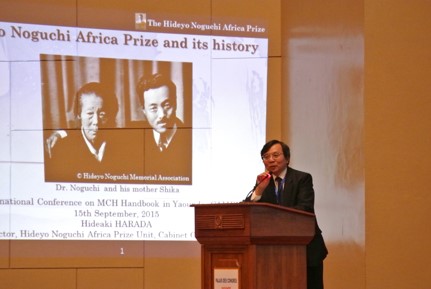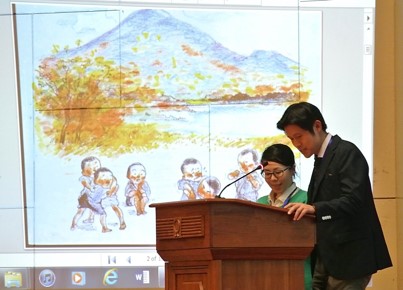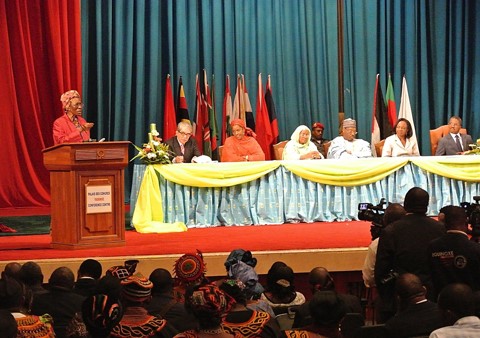9th International Conference on MCH Handbook held
The 9th International Conference on Maternal and Child Health (MCH) Handbook was held in the Republic of Cameroon from September 15 to 17, 2015,featuring the Hideyo Noguchi Africa Prize Symposium, which was held as a session of the conference from 6 p.m. on September 15, lasting approximately an hour. The symposium was attended by participants from around 20 countries, as well as more than 200 members associated with the Cameroon Ministry of Public Health.
1. To open the session, Hideaki Harada, Director of the Hideyo Noguchi Africa Prize Unit, explained with slides the background and objectives of the prize, the previous laureates, and the achievements of Dr. Noguchi.

Hideaki Harada, Director of the Hideyo Noguchi Afria Prize Unit, Cabinet Office of Government of Japan, addresses the audience.
Following this, Kondo, Deputy Director of JICA’s Human Development Department, and Komatsu, staff International Committee on MCH Handbook introduced the life of Dr. Noguchi through a picture-story show.

Kondo, Deputy Director of JICA's Human Development Department (right), and
Komatsu, staff International Committee on MCH Handbook (left)
present the life of Dr.Noguchi as a picture-story show.
2. Following this, Prof. Miriam K. Were, laureate for Medical Services of the inaugural Hideyo Noguchi Africa Prize, gave a keynote address titled “Why the Hideyo Noguchi Africa Prize is important for Africa.” The summary of her speech is the following:
(1) Prof. Were pointed our three main reasons why the Hideyo Noguchi Africa Prize is important for Africa: (i) the prize recognizes the need for action to tackle and solve the problems facing Africa through improvements in health and medicine, (ii) as its objective states, the prize aims to contribute to the health and welfare not only of the African people, but of all humankind, (iii) the prize is separated into two categories—outstanding achievements in the fields of Medical Research and Medical Services—emphasizing the fact that only through cooperation and collaboration between these two fields can advancements in the medical field be achieved.

Prof. Were speaks at the conference.
(2) In addition, Prof. Were suggested ways that the Japanese government, using its JICA channels in respective countries, could work to firmly establish and further raise the profile of the prize, such as launch of a “Hideyo Noguchi Project” aimed at (i) developing human resources to engage in basic medical research at universities and other institutions and (ii) initiating grassroots level programs to improve community medical services.
